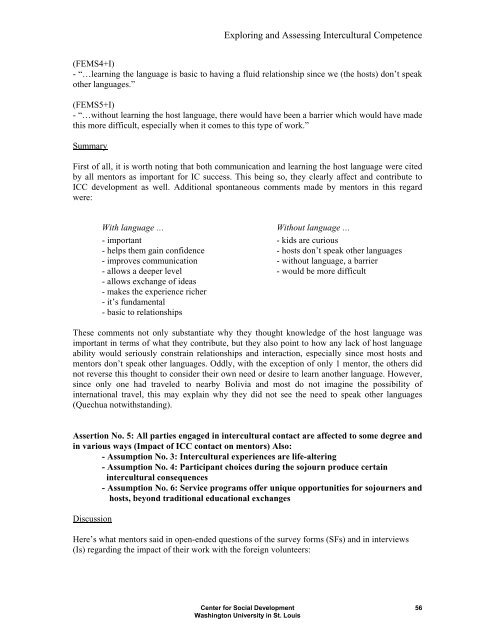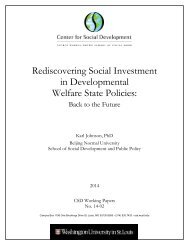Exploring and Assessing Intercultural Competence - Center for ...
Exploring and Assessing Intercultural Competence - Center for ...
Exploring and Assessing Intercultural Competence - Center for ...
Create successful ePaper yourself
Turn your PDF publications into a flip-book with our unique Google optimized e-Paper software.
<strong>Exploring</strong> <strong>and</strong> <strong>Assessing</strong> <strong>Intercultural</strong> <strong>Competence</strong><br />
(FEMS4+I)<br />
- “…learning the language is basic to having a fluid relationship since we (the hosts) don’t speak<br />
other languages.”<br />
(FEMS5+I)<br />
- “…without learning the host language, there would have been a barrier which would have made<br />
this more difficult, especially when it comes to this type of work.”<br />
Summary<br />
First of all, it is worth noting that both communication <strong>and</strong> learning the host language were cited<br />
by all mentors as important <strong>for</strong> IC success. This being so, they clearly affect <strong>and</strong> contribute to<br />
ICC development as well. Additional spontaneous comments made by mentors in this regard<br />
were:<br />
With language … Without language …<br />
- important - kids are curious<br />
- helps them gain confidence - hosts don’t speak other languages<br />
- improves communication - without language, a barrier<br />
- allows a deeper level - would be more difficult<br />
- allows exchange of ideas<br />
- makes the experience richer<br />
- it’s fundamental<br />
- basic to relationships<br />
These comments not only substantiate why they thought knowledge of the host language was<br />
important in terms of what they contribute, but they also point to how any lack of host language<br />
ability would seriously constrain relationships <strong>and</strong> interaction, especially since most hosts <strong>and</strong><br />
mentors don’t speak other languages. Oddly, with the exception of only 1 mentor, the others did<br />
not reverse this thought to consider their own need or desire to learn another language. However,<br />
since only one had traveled to nearby Bolivia <strong>and</strong> most do not imagine the possibility of<br />
international travel, this may explain why they did not see the need to speak other languages<br />
(Quechua notwithst<strong>and</strong>ing).<br />
Assertion No. 5: All parties engaged in intercultural contact are affected to some degree <strong>and</strong><br />
in various ways (Impact of ICC contact on mentors) Also:<br />
- Assumption No. 3: <strong>Intercultural</strong> experiences are life-altering<br />
- Assumption No. 4: Participant choices during the sojourn produce certain<br />
intercultural consequences<br />
- Assumption No. 6: Service programs offer unique opportunities <strong>for</strong> sojourners <strong>and</strong><br />
hosts, beyond traditional educational exchanges<br />
Discussion<br />
Here’s what mentors said in open-ended questions of the survey <strong>for</strong>ms (SFs) <strong>and</strong> in interviews<br />
(Is) regarding the impact of their work with the <strong>for</strong>eign volunteers:<br />
<strong>Center</strong> <strong>for</strong> Social Development<br />
Washington University in St. Louis<br />
56
















